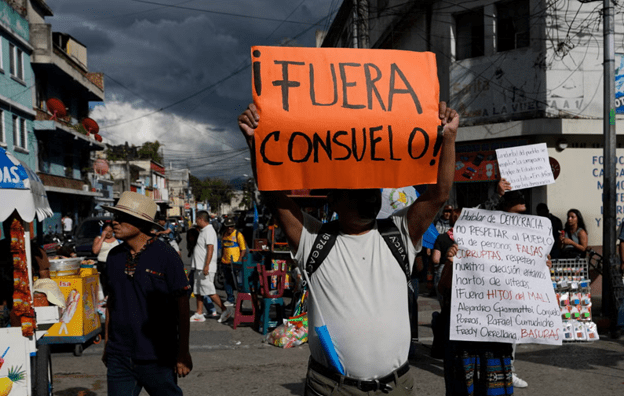
Edgar Gutierrez, Guatemala’s former foreign minister believes Bernardo Arevalo’s election is legitimate, but it’s been caught “in the crossfire.” If this continues, Arevalo will face “a precarious governance.”
By Carlos F Chamorro (Confidencial)
HAVANA TIMES – Following two weeks of citizen strikes, with highways blocked and protesters demanding the departure of Consuelo Porras, and respect for the popular will that elected Bernardo Arevalo to the presidency on August 20th, “Guatemala faces a delicate political balance,” declares former foreign minister Edgar Gutierrez, now exiled in Mexico.
On the one hand, the citizens’ movement – led by the mayors of the indigenous towns – has succeeded in paralyzing the country. On the other, President Alejandro Giammattei and the private sector are refusing to pressure Attorney General Porras into resigning. Instead, the current president has endorsed Porras’ efforts to derail the popular mandate given to president-elect Bernardo Arevalo.
If the next weeks don’t bring a violent outcome to the protests, or a negotiation, and the impasse continues until Bernardo Arevalo’s scheduled inauguration on January 14 of next year, “Arevalo will succeed in becoming Guatemala’s next President, but amid great wear and tear and with a very precarious capacity to govern,” Gutierrez warns. The conversation between Confidencial director Carlos Fernandez Chamorro and the former Guatemalan foreign minister took place on the weekly online Nicaraguan news program Esta Semana.
Right now in Guatemala, there’s a President-elect -Bernardo Arevalo- who won the elections. But there also seems to be a Coup d’etat in progress, spearheaded by the Attorney General and aimed at keeping Arevalo from taking office on January 14. Which way is the political balance tipping?
Edgar Gutierrez: It’s a very delicate balance. The mobilization of the indigenous peoples has been well established. It’s been going on for nearly two weeks now and has paralyzed the country. This movement of the indigenous people, led by their ancestral authorities, is very important, but it’s not about the defense of Bernardo Arevalo of the Semilla Party – it’s a matter of defending the integrity of the vote, and enforcing respect for the popular will that was expressed at the polls last August 20th. And this has leveled the playing field.
Clearly, the Attorney General’s office has the force of the criminal accusation behind it, but it also has the enormous weakness of illegality and lack of legitimacy. In fact, in the last three or four days, Attorney General Consuelo Porras hasn’t appeared in her office, and is apparently spending her nights in the army barracks. That image is evidence that they’re all but cornered by the people.
However, Consuelo Porras has declared she’s not going to resign, and President Giammattei has said that he can’t dismiss her because, according to the law, she’d have to be guilty of some crime for that to happen. So, will Attorney General Consuelo Porras, Prosecutor Roberto Curruchiche, and Judge Orellana all remain in their posts?
To be found guilty of a crime, she would have to judge herself or present such a case, and she’s not about to commit legal suicide. The President has other instruments. For example, he’s the head of the State bureaucracy, and he could apply an administrative sanction because she hasn’t shown up at her office for three or four days, and has no formal excuse not to do so.
President Giammatei and the Attorney General

President-elect Bernardo Arevalo has accused President Giammatei of being the one responsible for this crisis and has demanded he take action. But what’s Giammatei’s position? Is he endorsing or questioning the attitude of the Attorney General’s office?
He’s endorsing it. If President Giammatei thought at any time about removing his support for Attorney General Consuelo Porras, that moment expired on Monday, October 9th, when the Attorney General pu


